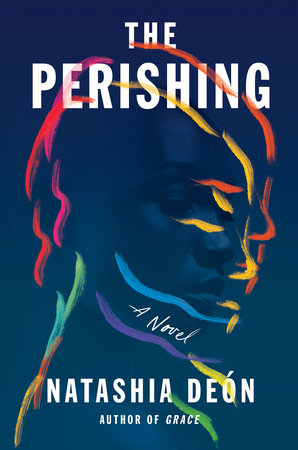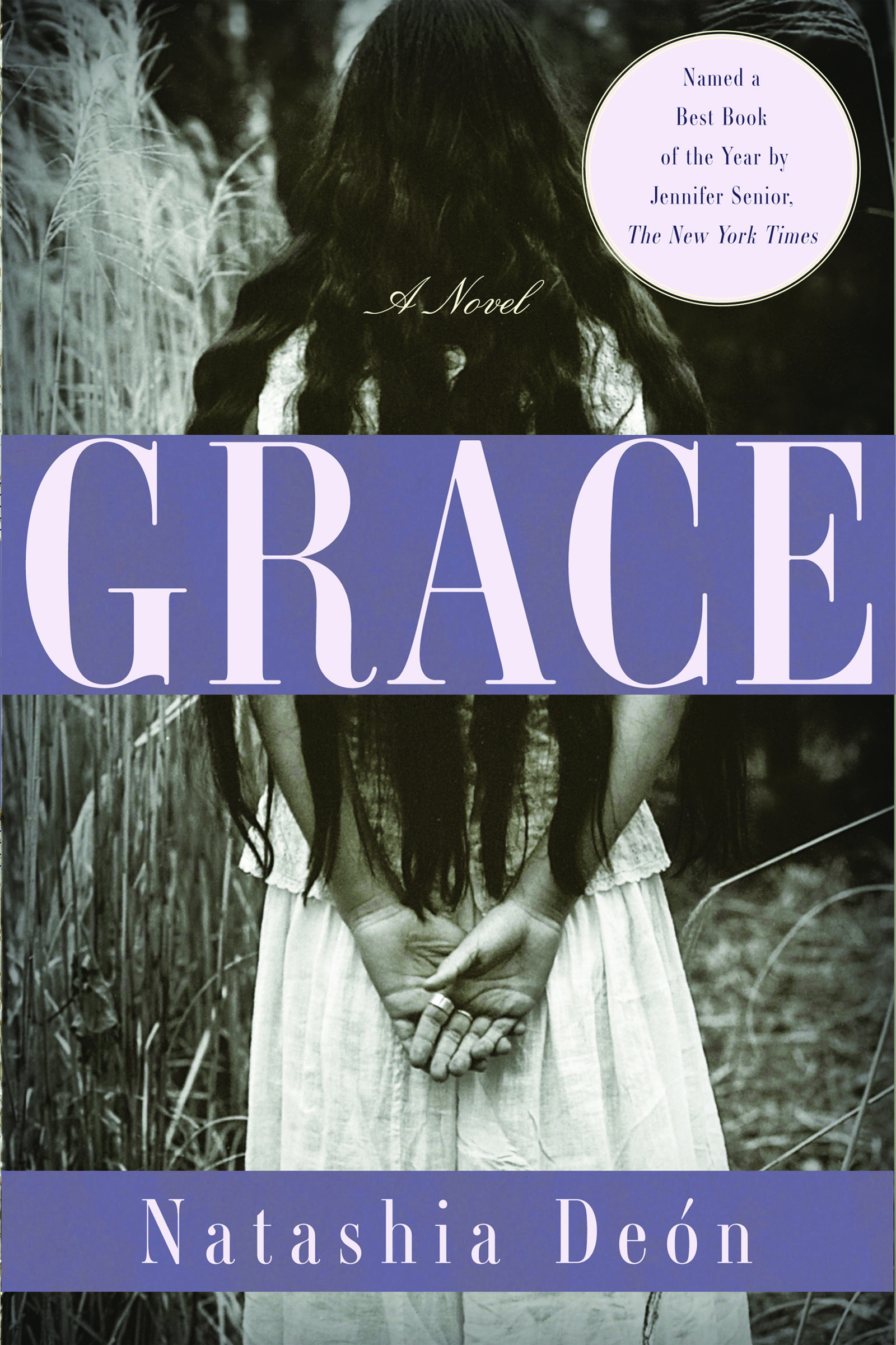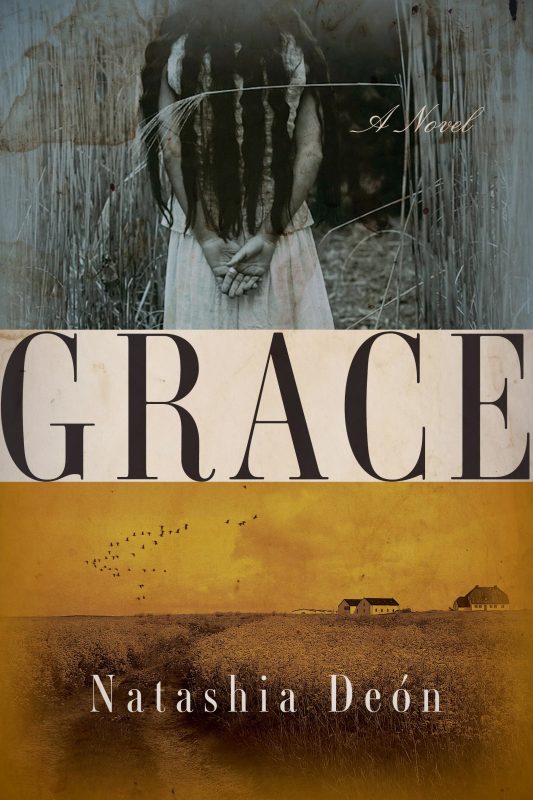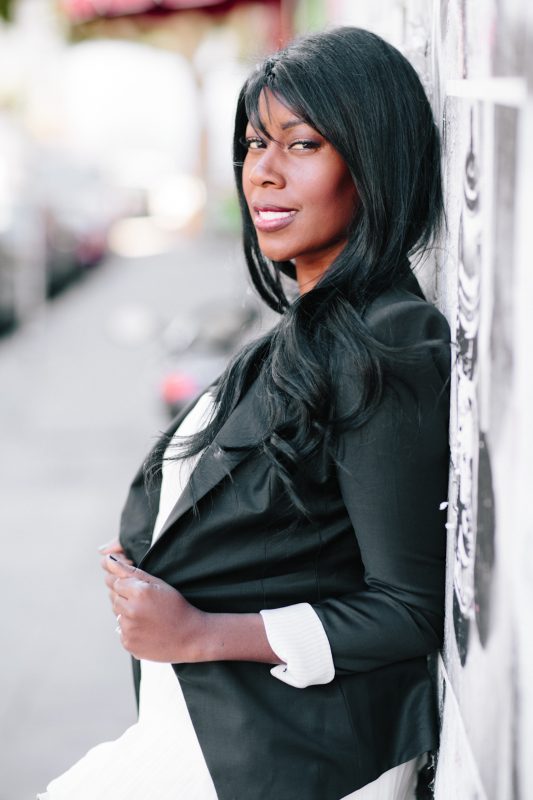

Natashia Deón
Acclaimed Novelist


Readings &
Lecture Topics
- Faith in Writing
- Plotting a Novel
- Backstory
- The Business of Writing
- Community Building through Writing
- An Evening with Natashia Deon
Biography
“Justice is a concept that is always on Natashia Deón’s mind. As a lawyer, a law professor, a mother, and a novelist, it undergirds all she does.” —LA Times
“Natashia Deón’s emotional range spans several octaves. She writes with her nerves, generating terrific suspense. And her style is so visual it plays tricks on the imagination — did I just watch that scene? Or did I read it?” —New York Times
Natashia Deón is the author of the critically-acclaimed novel, Grace (Counterpoint Press, 2016)—which was awarded the 2017 First Novel Prize by the American Library Association’s Black Caucus (BCALA). The novel was named a Kirkus Review Best Book of 2016, a New York Times Top Book 2016, a Book Riot Favorite Book of 2016, The Root Best Book of 2016, and Entropy Magazine Best Book of 2016. Author Caroline Leavitt describes Grace as “exploring a teeming, post-Civil War world where the emancipation of slaves can be anything but freedom.”, and the Kirkus starred review praised it thus: “[T]his is a brave story, necessary and poignant; it is a story that demands to be heard. This is the violent, terrifying world of the antebellum South, where African-American women were prey and their babies sold like livestock. This is the story of mothers and daughters—of violence, absence, love, and legacies.” In the novel, Naomi, the narrator — the specter of a dead slave — watches over her child as she grows amid the turmoil surrounding the Civil War. At one point, Naomi’s ghostly presence is felt in the land of the living, where a character says to the wraith, “There’s no justice. Only grace.” (LA Times).
Deón is also the author of The Perishing (Counterpoint Press, 2021), which was nominated for a 2021 NAACP Image Award. The novel follows a Black immortal woman in 1930s Los Angeles trying to save the world. Set against the rich historical landscape of Depression-era Los Angeles, The Perishing charts a course through a changing city confronting racism, poverty, and the drumbeat of a coming war for one miraculous woman whose fate is inextricably linked to the city she comes to call home.
A UCLA creative writing professor, mother of two, Deón is creator of two popular L.A.-based reading series: Dirty Laundry Lit, a non-profit that focuses on introducing people to literature, and The Table. In 2017, she was a US Delegate to Armenia as part of the U.S. Embassy’s reconciliation project between Turkey and Armenia, in partnership with the University of Iowa’s International Writing Program.
A practicing attorney and law professor, Deón speaks to and for an abolition of the prison industrial complex—what she terms warehouses of people—through the reduction of prisons and penalties for crime. She is for rehabilitation — “real rehabilitation” — especially for those serving life sentences or have been sentenced to death. Her primary focus is drug offense sentencing reduction and rights restoration. Deón says, “My work is not primarily legislative or policy driven. My function as a lawyer is boots on the ground.” She birthed a 501c3 non-profit called REDEEMED the focus of which is to create a hub of services and relief for those who have been incarcerated or have been convicted of crimes.
In 2018, Deón created the Drunk Girls Bible Study podcast, promoted as “A real talk Christian podcast about the Word. (And we’ll try not to say bad words).”
Deón is the recipient of a PEN Center USA Emerging Voices Fellowship, and has been awarded fellowships and residencies at Yale, Bread Loaf Writer’s Conference, Prague’s Creative Writing Program, Dickinson House in Belgium, and the Virginia Center for Creative Arts. She has an MFA in Creative Writing from the University of California, Riverside-Palm Desert. Her writing has appeared in American Short Fiction, Buzzfeed, LA Review of Books, The Rumpus, The Feminist Wire, Asian American Lit Review, Rattling Wall and other places.
Short Bio
Natashia Deón is a 2017 NAACP Image Award Nominee and author of the critically-acclaimed novel, Grace, which was named a best book of 2016 by The New York Times, The Root, Kirkus Review, Book Riot, and Entropy Magazine, and has been featured in People Magazine, TIME Magazine, and Red Book. Grace won the 2017 American Library Association, Black Caucus Award for Best Debut Fiction. She is also the author of the novel The Perishing, which was nominated for a 2021 NAACP Image Award. A practicing attorney, mother, and law professor, Deón is the recipient of a PEN Center USA Emerging Voices Fellowship and served as a 2017 U.S. Delegate to Armenia in partnership with the University of Iowa’s International Writing Program, for a reconciliation project involving Armenian and Turkish writers.
Visit Author WebsiteVideos
Publications
The Perishing
Novel, 2021
Lou, a young Black woman, wakes up in an alley in 1930s Los Angeles, nearly naked and with no memory of how she got there or where she’s from, only a fleeting sense that this isn’t the first time she’s found herself in similar circumstances. Taken in by a caring foster family, Lou dedicates herself to her education while trying to put her mysterious origins behind her. She’ll go on to become the first Black female journalist at the Los Angeles Times, but Lou’s extraordinary life is about to become even more remarkable. When she befriends a firefighter at a downtown boxing gym, Lou is shocked to realize that though she has no memory of ever meeting him she’s been drawing his face since her days in foster care. Increasingly certain that their paths have previously crossed—perhaps even in a past life–and coupled with unexplainable flashes from different times that have been haunting her dreams, Lou begins to believe she may be an immortal sent to this place and time for a very important reason, one that only others like her will be able to explain. Relying on her journalistic training and with the help of her friends, Lou sets out to investigate the mystery of her existence and make sense of the jumble of lifetimes calling to her from throughout the ages before her time runs out for good. Set against the rich historical landscape of Depression-era Los Angeles, The Perishing charts a course through a changing city confronting racism, poverty, and the drumbeat of a coming war for one miraculous woman whose fate is inextricably linked to the city she comes to call home.
Grace
Novel, 2016
“Gripping and deeply affecting, Grace is an examination of injustice, violence, love, legacies, and survival.”—Buzzfeed
For a runaway slave in the 1840s south, life on the run can be just as dangerous as life under a sadistic Massa. That’s what fifteen-year-old Naomi learns after she escapes the brutal confines of life on an Alabama plantation and takes refuge in a Georgia brothel run by a gun-toting Jewish madam named Cynthia. Amidst a revolving door of gamblers and prostitutes, Naomi falls into a love affair with a smooth-talking white man named Jeremy. The product of their union is Josey, whose white skin and blond hair mark her as different from the others on the plantation. Having been taken in as an infant by a free slave named Charles, Josey has never known her mother, who was murdered at her birth. Josey soon becomes caught in the tide of history when news of the Emancipation Proclamation reaches her and a day of supposed freedom turns into one of unfathomable violence that will define Josey―and her lost mother― for years to come. Grace is a sweeping, intergenerational saga featuring a group of outcast women during one of the most compelling eras in American history. It is a universal story of freedom, love, and motherhood, told in a dazzling and original voice set against a rich and transporting historical backdrop.
Articles & Audio
Read What’s In Print
• Virginia’s Beloved controversy shows there can be no healing without pain – LA Times
• Ain’t No Justice. Only Grace – LA Review of Books
• An Interview with Natashia Deon – The Articles of Antiquity
• “How Motherhood Changed My…” by Natashia Déon – New York Times
• Natashia Deón may be the hardest-working debut novelist in Los Angeles – LA Times
• Review: Natashia Deón’s Grace, a Tale of Slavery, Its Ghosts and Legacy – New York Times
• Natashia Deon: Defense Attorney By Day, Novelist By Night – LA Weekly
Selected Writings
• Read an excerpt from The Perishing – Harper’s Magazine
GRACE (excerpt)
Flash
Faunsdale, Alabama 1838
The knockin’s always there behind the wall in Momma’s room. I call it Momma’s music. My sister Hazel calls it Momma’s tired tune, a shrill note sucked and blown from a stiff reed.
Hazel’s the closest thing I got to a good daddy so she never beat me for misbehaving, never leaves me long, and never tries to touch me the wrong way. She keeps me safe in this world, keeps me safe from the knockin.
We sit in the back of our dark two-room shack, huddled under a blanket together. She’s trying to drown out Momma’s song with her hand cupped over my ear, fogging it up with her whispering, telling me we gon’ play a game called, “Let’s see who can fall asleep the fastest.” But after ten minutes of trying, even the late of midnight cain’t shake my eyelids free so now me and Hazel gon’ play a new game. It’s called “Who can be the quietest the longest.”
We always quiet, though. We got to be so Massa don’t remember we here. Hazel say Massa might forget about her, like he did me, since I was born early and he ain’t sure I come at all. The whiskey keeps him guessing and asking every year. He come out to the yard in the fall-time to hand out our yearly portions and he mumbles his question about me under his breath and to the air like he ain’t really asking. Hazel say he scratch his head, squint his eyes, rub his belly and mumble some words about a baby from a while back, too unsure to make his words clear but hoping somebody pick up on ’em anyway and cure his memory, tell on me.
But nobody do.
My Momma’s worth protecting so everybody look at him walleyed ’til he leave the question alone.
Me and Hazel go out late at night or at dusk when Massa’s gone to town, or ain’t coming back for days. We was wrong twice. Had to run back fast. The fear made me faster than Hazel. Faster than Massa, too. It was dusk both times.
Dusk is where it’s safe.
And dusk is where the magic is. Where you can hide things in the orange-pink shade of a losing day. Even the green waters of Moss Lake get blended-gone from dusk. You can stand a running leap away from its wave and not see the water. Like it’s just another part of field.
Dusk blends me away, too.
It’s why Hazel takes me out in it, hand-holding, running me through the short patch of the woods to the flatlands where gray shadows form four feet above the ground, mouth height, and buzz. Netted clouds of gnats, they are. And we race the light through ’em and they spread when we do, then close behind us, recaptured. I spit out the slow ones.
Hazel say I get my speed from my daddy. I hate that we ain’t got the same one, though. Her daddy was the nigga before Boss. Mine was a tenant farmer that Massa tried to sell a bad piece of land to. “Before you know it,” Massa woulda told him, “you’ll have your own slaves”—the same way he promised every poor white fool renting land from him. Probably made the offer on one of his celebration nights when he would spend the money he didn’t have and invite the whole town, make Momma dress up and smile.
I tell peoples my daddy was a Indian like the ones I seen around here. Hazel keep my hair braided long down my back to prove it. We lie cause family’s more important than truth and ain’t no point in reminding Momma.
The knockin’s getting louder so Hazel say she gon’ whisper my favorite story in my ear. “And when the Prince came, he gave her a kiss to remember him by.” Thas how she always try to finish my story.
“Ugh! Not a kiss, Hazel! Tell it right.”
Hazel’s gon’ be full-grown soon. She turned eleven her last birthday. I picked the same day for my birthday so I be just like Hazel even though she come four winters before me. Momma said when Hazel was born, she could hardly push her out on the account that Hazel was fat. But that ain’t why Massa couldn’t sell her like I first reckoned. He sell big fat babies all the time. Even the ones with big heads. Hazel say it’s cause money come hard for white folk too, like it did when Massa lost most everything he had. That was the year I was born. Hazel say he sold off most of the slaves that lived here with us and said he was gon’ buy some new ones but they never come. So we got a two-room cabin on our own, separated by a wall and a door. Me and Hazel stay in this back room where cain’t nobody see us.
We sleep together on the feather-stuffed mat inside a bed box and keep a wood barrel turn upside down next to us. We use it for a table most times but if Massa seem like he gon’ come back this way, Hazel cover me with it and put our piss pot on top so he don’t get tempted to wonder.
Hazel’s smart. She know everything. Even thangs Momma don’t know.
“A’right, a’right,” Hazel say. “When the Prince came…he give her a tickle like this!” She grab my foot and rumble her fingers around. I laugh so hard my mouth git stuck open and fill up with air so cain’t no words, no sound, nothin come out and I cain’t breathe.
“Pleeeasseee! Stop, Hazel, stop.”
“Sssh!” she say and look over her shoulder toward the back wall listening for Momma’s music. It’s still playing. A soft knock. A louder one.
She pinch my big toe, tug it out like she gon’ crack it. I hate that. She whisper, “Say, I smell like stinky cheese.”
“You smell like stinky cheese,” I whisper, giggling.
“No, say, you-Naomi smells like stinky cheese.”
I catch the sound of my laugh in my hands.
Hazel’s making shadows on the wall now. I ain’t got a dog but Hazel make me one. She use both hands to put a shadow of me on the wall, too, and make the legs walk.
Hazel say she put everything she love on that wall cause it block out the bad. Thas why she mark on it for everyone thas gone. She up to five scratches now, all of ’em baby girls. Most of ’em came between us, all but one. That one come and go last summer but I don’t miss her. There ain’t enough room for a baby and ain’t enough warm when cold winds blow through.
Massa tol’ Momma that he give her a better life than the others on the row and say he can keep a good eye on us where we is. He’s particular about everything—how they hang clothes on the line to dry and how Miss Dean spin the cotton and stitch the clothes. He make a rule that Hazel got to keep her candle burning on the nights he come so he won’t mistake her for a rat or a coon and shoot her. She never forget. The candle she got burning now is brighter than ever.
Massa brung that black man with him tonight, too. The one who started the knockin. I can feel him thumping Momma through the wall. It sets a pace in my chest like a drummer ‘bout to lead a marching band. When I close my eyes, I imagine I see ’em, black boys dressed in raggedy clothes, holding fourth-hand instruments, ready to please the crowd.
Knockin’s stopped.
That means Momma’s through.
Me and Hazel tiptoe fast to the split in the wall. Hazel always beat me to it cause she don’t never want me to see Momma after the knockin. Say it’s private. But I want the light from the other room to slide over my face too, so I cheat and step back a little, just behind her.
I can see Momma sitting on the edge of the bed wit no clothes on. That black man that was on top of her don’t have no clothes neither, just walking ’cross the room like he ain’t got no care in the world even though he black like us.
He make the light disappear when he pass us.
Massa Hilden’s in there, too, standing in the corner watching. He don’t never wear the jacket to that brown suit. His whole body’s swole up in the material, making it cinch tight around his waist like a blouse. A gap in his shirt spreads open where the button’s gone. It mouths silent words when his gut moves from breathing. The hair on his belly is poking through the gap, thick and coarse and tangled like a pile of wadded thread, brown and white. It loops and crisscrosses over his shiny pink belly fat.
Cain’t see his silly shoes, though.
Those make me laugh cause they long and skinny and ugly like dead banana peels he stepped on and they held on.
On the back of his trousers, a lump sticks out above his butt where he keeps his pistol. Its off-white handle, the color of new teeth, is showing just above his waist and it keeps everybody in order, even white peoples. He always got it on him, can get downright dangerous when he’s drinking. Killed a white man a few years back. He tells people it was a accident but Hazel say he meant to. He shoot at a lot of people. Even my real daddy. It’s why Hazel knows my daddy was fast. Massa said my daddy wasted his time, wouldn’t sign the papers to buy that land, coulda sold it to somebody else so he shot at ’im. He called the law on Massa. Didn’t nothing happen, though.
“Naomi, get back! You gon’ mess around and get us all killed,” Hazel whisper.
“I just want to see his shoes, is all.”
“Shhh…” she say, waving me away.
I ease back a little. “They leavin? Momma ready for us now?”
I hear Massa. “I need males. Nine months of waiting needs to pay off bigger for me. These girls ain’t pulling in nothing. No more girls, you hear me? Else they gon’ end up like you.”
“Yes’sa, Massa Hilden,” Momma say. “God gon’ bless me wit a boy this time.”
“And how’s Hazel?” he say. Hazel slides away from the wall slow like she don’t want to hear. She come toward me and I step aside, pretend I ain’t interested in getting in front of her to see Massa’s long baby feet.
“She should be of age now,” he say.
“No suh, no suh,” Momma say in a hurry. “She’s just a baby.”
“You just make sure it’s a boy this time.”
“Yes’sa, Massa Hilden. Yes’sa.”
I tiptoe around Hazel fast so she cain’t catch me before I get to the wall but she don’t race me this time. I smash my face in front of the opening. Cain’t see nothin. I get on my knees and look through the bottom hole. All I see is Momma sad and Massa gone.
Hazel’s on the other side of the room now, sitting close to the candlelight, flipping through the pages of her Bible. Massa’s mother gave the Bible to Hazel and two cousins. Said it would keep every one of us from being a heathen. But Hazel’s the only one she taught to read it. Just the first page before she died. The rest Hazel figured out on her own.
“In the beginning,” Hazel say with tears seeping through her lashes, “God created the heavens…” Her voice cracks from the tears caught in her throat. The free ones roll down her face and drip on her page. She looks at me, whispers, “You see that poker near the fire where Momma is?”
I turn back ’round on my knees to see through the hole again. “The one you found?” I say.
“That’s it. You see the end? It’s sharp. I grind it myself. It’s strong now. It’s ready.”
“Ready for what, Hazel?”
The door slams shut in the other room and I jump up. “Come on, Hazel! Momma’s ready for us!”
Hazel reach out to stop me even though she ain’t close enough to get me.
I stop anyway. “But I want to see her, Hazel.”
“Not now.”
“I want to see her.”
“Not now, Naomi!”
I stomp my foot, twist up my arms.
“Momma needs more time,” she say. “Not like before. She gotta try harder, make a baby. A boy baby for Massa Hilden. Get the most money.”
“I know she wanna see us.”
“Naomi, look…what Momma’s doin…what he make her do. Changes women. Makes ’em different.”
“Somethin’s wrong wit Momma?”
Hazel sighs the way she do when we daydreaming on the porch at night, when she’s telling me about her North. I go close to her, dress myself with her, slipping under her arm and resting there. “North,” she say, “is a place where we could belong to ourselves and to the people we choose, in love and kindness, and in the sharing of God’s good things.”
“Let’s go North,” I tell Hazel to make her happy again. “Let’s find that star. Take Momma and go that way.”
“Ain’t just a direction,” she say. I hold her hand up to the end of my corded braid and she takes it between her fingertips, unbraids it, and combs her fingers through. “The north star don’t mean nothin to those who cain’t read it. Could mean south or east or west, just the same.”
“That’s why I got you,” I say. Hazel’s my guide, my light in darkness, one of them stars that like a handful of little moons were shrunk to pebbles then flung to the heavens where they sat.
“Then I’ll teach you,” she say. She wraps her arms around me and pulls me into her softness. “One day, we gon’ go to Boston where it’s safe. We gon’ wear the pretty dresses Momma made us and drink sweet tea all day long.”




